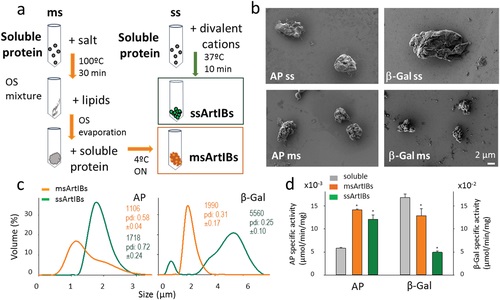https://onlinelibrary.wiley.com/doi/full/10.1002/advs.201902420
https://doi.org/10.1002/advs.201902420
 Abstract
Abstract
Bacterial inclusion bodies (IBs) are mechanically stable protein particles in the microscale, which behave as robust, slow‐protein‐releasing amyloids. Upon exposure to cultured cells or upon subcutaneous or intratumor injection, these protein materials secrete functional IB polypeptides, functionally mimicking the endocrine release of peptide hormones from secretory amyloid granules. Being appealing as delivery systems for prolonged protein drug release, the development of IBs toward clinical applications is, however, severely constrained by their bacterial origin and by the undefined and protein‐to‐protein, batch‐to‐batch variable composition. In this context, the de novo fabrication of artificial IBs (ArtIBs) by simple, cell‐free physicochemical methods, using pure components at defined amounts is proposed here. By this, the resulting functional protein microparticles are intriguing, chemically defined biomimetic materials that replicate relevant functionalities of natural IBs, including mammalian cell penetration and local or remote release of functional ArtIB‐forming protein. In default of severe regulatory issues, the concept of ArtIBs is proposed as a novel exploitable category of biomaterials for biotechnological and biomedical applications, resulting from simple fabrication and envisaging soft developmental routes to clinics.
